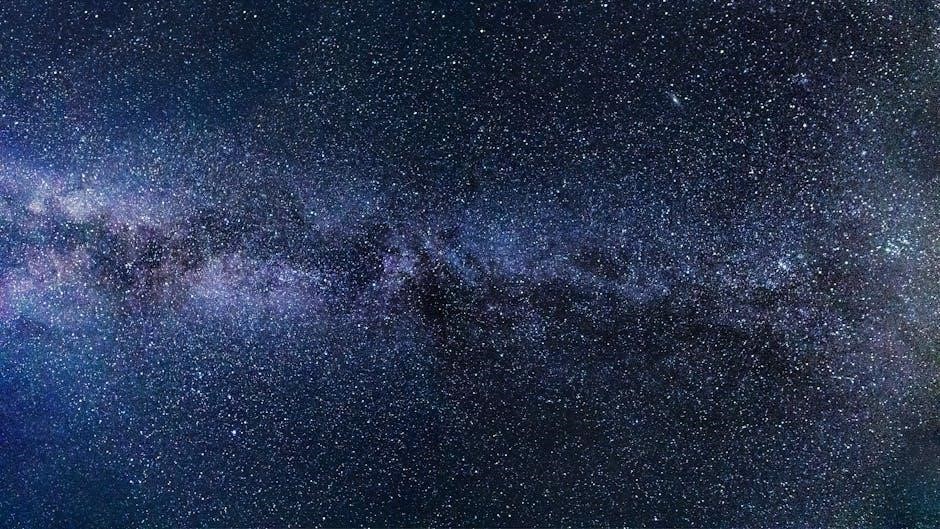The Hitchhiker’s Guide to the Galaxy by Douglas Adams is a groundbreaking sci-fi comedy that blends absurd humor with intellectual depth, capturing the essence of cosmic exploration and human absurdity.
First published in 1979, this cult classic has become a cornerstone of British science fiction, offering a unique perspective on existence, bureaucracy, and the unpredictability of the universe.
With its witty narrative and satirical tone, the book has resonated with readers worldwide, making it a must-read for both sci-fi enthusiasts and those seeking a laugh-out-loud adventure.
Its enduring popularity lies in its ability to balance surreal scenarios with profound reflections, cementing its place as a timeless literary gem in modern pop culture.
Overview of the Book and Its Author
The Hitchhiker’s Guide to the Galaxy is the first book in Douglas Adams’ iconic series, blending science fiction, comedy, and philosophy. Originally conceived as a radio series in 1978, it was published as a novel in 1979, quickly gaining cult status.
Douglas Adams, a British author known for his wit and imaginative storytelling, crafted a narrative that follows Arthur Dent as he navigates the galaxy after Earth’s destruction. The book’s unique blend of humor, absurdity, and intellectual depth has made it a beloved classic worldwide.
Significance of the Title
The title The Hitchhiker’s Guide to the Galaxy reflects the book’s central theme of exploration and survival in an unknown universe. The “Guide” symbolizes a handbook for navigating cosmic uncertainties, mirroring humanity’s quest for understanding life’s complexities. Its clever wording captures the blend of humor and existential inquiry, making it iconic in science fiction literature.
Initial Impressions and Pop Culture References
Initial impressions of The Hitchhiker’s Guide to the Galaxy often highlight its unique blend of absurd humor and intellectual depth. The book’s witty dialogue and satirical take on science fiction captivate readers, making it a cult classic. Pop culture references abound, from the iconic “Don’t Panic!” catchphrase to the fictional Guide itself, which has inspired countless adaptations and merchandise. Its influence is evident in TV shows, films, and even everyday phrases, cementing its status as a cultural phenomenon.
Plot Summary and Key Elements
The story begins with Earth’s destruction to make way for a hyperspatial express route. Arthur Dent, rescued by Ford Prefect, embarks on a cosmic journey, encountering Vogons, Zaphod Beeblebrox, and Trillian while searching for the ultimate answer to life, the universe, and everything.
The Destruction of Earth and Arthur Dent’s Journey
The novel opens with Earth’s demolition to make way for a hyperspatial express route, leaving Arthur Dent as the sole human survivor. Rescued by his friend Ford Prefect, an alien researcher, Arthur embarks on a chaotic journey through space. The destruction of Earth serves as a catalyst for Arthur’s transformation from an ordinary man to a galactic traveler, grappling with existential questions and absurd cosmic encounters.
Ford Prefect, an alien researcher for The Hitchhiker’s Guide to the Galaxy, rescues Arthur Dent just as Earth is destroyed. The Guide, an electronic encyclopedia, becomes their trusted companion, offering insights into the galaxy’s bizarre wonders. Ford’s knowledge and the Guide’s witty advice, such as “Don’t Panic,” help the pair navigate absurd intergalactic adventures. The Guide’s iconic status is further highlighted by its inclusion of essential items like the towel, proving indispensable in their surreal journey through space.
Encounters with Vogons and Other Alien Species
The Vogons, a bureaucratic alien species, are the first major encounter, showcasing their brutal efficiency and love for terrible poetry. Their destruction of Earth highlights their indifference to life. The book introduces a variety of bizarre species, each reflecting Adams’ satirical humor and creativity. These encounters, filled with absurdity and dark wit, exemplify the book’s exploration of the galaxy’s unpredictability and the absurdity of alien cultures, adding depth to the narrative’s comedic and philosophical layers.
The Search for the Ultimate Answer to Life, the Universe, and Everything
The book’s central quest revolves around the ultimate question of existence, with the supercomputer Deep Thought revealing the answer as 42. This iconic moment highlights the futility of seeking simple solutions to life’s complexities. The narrative humorously explores existential themes, satirizing humanity’s obsession with grand explanations. Adams’ clever use of absurdity underscores the idea that understanding the “answer” may be less important than appreciating the journey itself, blending philosophy with comedy in a uniquely thought-provoking way.

Themes and Messages in the Book
The book humorously explores existential themes, satirizing bureaucracy and materialism, while emphasizing the importance of humor and open-mindedness in addressing life’s intrinsic complexities and uncertainties.
Existentialism and the Meaning of Life
Douglas Adams masterfully explores existential themes, questioning the purpose of life through the characters’ cosmic misadventures. Arthur Dent’s journey reflects humanity’s struggle to find meaning in an indifferent universe, while the supercomputer Deep Thought’s pursuit of the “Ultimate Answer” symbolizes the futility of seeking absolute truth. The book humorously highlights the absurdity of existence, suggesting that life’s meaning may lie in embracing uncertainty rather than seeking definitive answers. This philosophical undertone adds depth to the novel’s comedic narrative.
Satire of Bureaucracy and Materialism
The Hitchhiker’s Guide to the Galaxy cleverly satirizes bureaucracy and materialism, highlighting their absurdity. The Vogons, with their love for pointless paperwork and brutal efficiency, exemplify bureaucratic red tape. Earth’s destruction for a hyperspace bypass mocks humanity’s obsession with progress and material gain. Adams’ humor critiques societal values, suggesting that meaning is often lost in bureaucratic and consumerist pursuits. This commentary remains relevant, offering a sharp critique of modern society’s priorities and the dehumanizing effects of excessive materialism.
The Role of Humor in Exploring Complex Ideas
The Hitchhiker’s Guide to the Galaxy uses humor to tackle complex themes like existentialism and the meaning of life. Adams’ wit transforms profound questions into laughable scenarios, making them accessible. The absurdity of situations, like Vogon poetry or Marvin’s depression, highlights the futility of seeking life’s purpose through logic alone. This blend of comedy and philosophy allows readers to engage deeply with existential ideas while being thoroughly entertained, proving that humor can be a powerful tool for exploring life’s biggest mysteries.
Importance of Open-Mindedness and Curiosity
The Hitchhiker’s Guide to the Galaxy emphasizes the value of open-mindedness and curiosity in navigating life’s unpredictability. Arthur Dent’s journey through the galaxy forces him to embrace the unknown, illustrating how flexibility and curiosity are essential for survival. The book encourages readers to question assumptions and explore beyond their comfort zones, reflecting Adams’ belief that curiosity drives personal growth and understanding. This theme resonates deeply, reminding us that open-mindedness is key to thriving in an ever-changing universe.

Humor and Writing Style
Douglas Adams’ dry wit and absurdity shine through, blending clever wordplay with surreal scenarios. His unique narrative style combines humor with intellectual depth, making the book both entertaining and thought-provoking.
Douglas Adams’ Unique Wit and Dry Humor
Douglas Adams’ writing is a masterclass in dry wit and absurdity, blending clever wordplay with surreal scenarios. His humor is both genius and accessible, often masking profound truths beneath its light-hearted surface. The book’s comedic genius lies in its ability to turn complex ideas into hilarious, relatable moments, making even the most existential questions feel approachable. Adams’ unique voice captivates readers, creating a narrative that is both entertaining and intellectually stimulating, leaving a lasting impression on pop culture and literature alike.
Absurdity and Surrealism in the Narrative
Douglas Adams masterfully employs absurdity and surrealism to craft a narrative that is both hilarious and thought-provoking. From Vogon poetry to the infinite improbability drive, the book thrives on illogical scenarios that defy conventional logic. The absurdity of a supercomputer spending 7.5 million years to find the “answer to life, the universe, and everything” only to reveal it as 42 is a brilliant example of this. These elements create a unique, memorable reading experience that challenges readers to embrace the chaos of the universe.
Comedic Characters and Situations
The novel shines with its cast of eccentric characters, each contributing to the comedic chaos. Marvin, the perpetually depressed android, delivers dry, existential one-liners, while Zaphod Beeblebrox’s self-absorbed antics and two-headed charm add layers of absurdity. Ford Prefect’s calm amidst catastrophe and Arthur Dent’s relatable bewilderment further enrich the humor. Situations like Vogon poetry readings and the infinite improbability drive create surreal, laugh-out-loud moments. These elements blend seamlessly, making the book a masterclass in comedic storytelling and unforgettable character-driven absurdity.
British Humor and Its Appeal
Douglas Adams’ signature British humor shines through the book’s dry wit, absurdity, and satirical undertones. The novel’s clever wordplay, understated irony, and ridiculous scenarios resonate deeply with readers familiar with British comedy. Characters like Marvin, with his existential despair, and Vogon poetry, a hilariously dreadful concept, exemplify this humor. The blend of surrealism and relatable absurdity creates a uniquely British charm, appealing to both UK audiences and international readers who appreciate subtle, intelligent comedy. Its timeless humor remains a key factor in the book’s enduring popularity.

Main Characters and Their Roles
The Hitchhiker’s Guide to the Galaxy features a diverse cast, including Arthur Dent, the relatable everyman; Ford Prefect, the alien researcher; Zaphod Beeblebrox, the charismatic two-headed president; Trillian, the intelligent human woman; and Marvin, the depressed android, each contributing uniquely to the story’s humor and depth.
Arthur Dent: The Relatable Everyman
Arthur Dent, an ordinary man from Earth, becomes the unlikely protagonist of an intergalactic adventure. His relatable everyman persona makes him a bridge for readers to connect with the absurdity of the universe. Initially overwhelmed by Earth’s destruction, Arthur’s resilience and curiosity drive his journey. His reactions to alien encounters and cosmic chaos mirror human vulnerability and humor. Dent’s character embodies the struggle to find meaning in an indifferent universe, making him a deeply sympathetic and human anchor in a chaotic, fantastical world.
Ford Prefect: The Alien Researcher
Ford Prefect, an alien researcher for The Hitchhiker’s Guide to the Galaxy, is a pivotal character whose dry wit and intergalactic knowledge steer the narrative. Rescuing Arthur Dent moments before Earth’s destruction, Ford embodies a calm, resourceful being navigating cosmic chaos. His role as a researcher underscores his detached curiosity, while his friendship with Arthur humanizes him. Ford’s insights and humor provide a bridge between Earth’s familiarity and the galaxy’s absurdity, making him an indispensable guide in the story’s unpredictable journey.
Zaphod Beeblebrox: The Two-Headed President
Zaphod Beeblebrox, the charismatic yet self-absorbed two-headed president of the galaxy, brings unpredictability and flair to the story. His dual heads symbolize his conflicting personalities—one confident and cunning, the other reckless and impulsive. Zaphod’s charm and audacity drive much of the plot, as he commandeers the ship Heart of Gold, showcasing his flair for adventure. Despite his erratic behavior, he remains a central figure in the quest for the ultimate answer, embodying the book’s blend of humor and cosmic unpredictability.
Trillian: The Intelligent and Resourceful Human
Trillian, the sole human female companion, exhibits remarkable intelligence and adaptability. Rescued by Zaphod before Earth’s destruction, she quickly embraces the vastness of space, showcasing her resilience. Her sharp wit and practical thinking often help the group navigate chaotic situations, making her an invaluable asset. Despite the absurdity around her, Trillian remains grounded, proving that humanity’s ingenuity can thrive even in the most unpredictable cosmic adventures.
Marvin: The Depressed Android
Marvin, the paranoid android, is a fan-favorite character known for his relentless pessimism and dry wit. His depression stems from his vast intelligence and awareness of life’s futility, often expressing his despair through dark humor. Despite his gloomy outlook, Marvin occasionally shows unexpected loyalty to his companions, providing comedic relief and philosophical insights. His character serves as a satirical reflection on artificial intelligence and existential dread, making him a memorable and relatable figure in the story.
Reception and Reviews
The Hitchhiker’s Guide to the Galaxy received widespread critical acclaim for its ingenious humor and intellectual depth, charming both sci-fi enthusiasts and general readers alike.
Critical Acclaim and Praise
The Hitchhiker’s Guide to the Galaxy has garnered widespread critical acclaim for its masterful blend of humor and intellectual depth. Reviewers praise Douglas Adams’ unique wit, absurdity, and ability to turn complex ideas into hilarious, thought-provoking narratives. The book is often hailed as a masterpiece of science fiction, celebrated for its originality and influence on the genre. Its clever satire and surreal storytelling have resonated with readers and critics alike, solidifying its status as a timeless literary classic.
Audience Response and Fan Base
The Hitchhiker’s Guide to the Galaxy has cultivated a devoted fan base across generations, appealing to both sci-fi enthusiasts and casual readers. Fans praise its humor, creativity, and relatable characters, making it a beloved classic. The book’s unique blend of wit and philosophy has inspired countless readers, fostering a loyal community that continues to grow. Its influence extends beyond literature, shaping pop culture and remaining a staple in many readers’ libraries, ensuring its enduring popularity and timeless appeal.
Comparisons to Other Sci-Fi Works
The Hitchhiker’s Guide to the Galaxy is often compared to other iconic sci-fi works, such as Isaac Asimov’s Encyclopedia Galactica, with its fictional rivalry adding depth to the narrative. Its absurd humor and satirical tone set it apart from more serious sci-fi, drawing parallels to Kurt Vonnegut’s The Sirens of Titan. Yet, Adams’ unique wit and surreal storytelling make it a standout, blending humor with intellectual exploration. The book’s influence is evident, inspiring countless writers and creators, solidifying its place as a British sci-fi gem alongside American classics.
Impact on Popular Culture
The Hitchhiker’s Guide to the Galaxy has left an indelible mark on popular culture, inspiring countless adaptations, including TV shows, films, radio series, and stage productions. Its iconic humor and quirky characters have influenced writers, comedians, and creators worldwide. The book’s merchandise, from towels to comics, has become cult favorites. Its themes and phrases, like “Don’t Panic,” are widely referenced, while its blend of satire and sci-fi continues to shape modern comedy and literature. Its enduring legacy ensures it remains a cultural touchstone, transcending generations.

Adaptations and Spin-Offs
The Hitchhiker’s Guide to the Galaxy has spawned radio series, TV shows, films, stage productions, and comic books, with the iconic bath towel merchandise. A video game adaptation also emerged, thrilling fans further.
Radio Series, TV Show, and Film Adaptations
The Hitchhiker’s Guide to the Galaxy began as a BBC Radio 4 series in 1978, gaining cult status. It was later adapted into a TV series in 1981, featuring stunning visuals and humor. The 2005 film adaptation, narrated by Stephen Fry as The Guide, introduced the story to a new generation, starring Martin Freeman as Arthur Dent. Each adaptation captures the book’s wit and absurdity, staying true to its core themes while expanding its reach across media platforms.
Stage Productions and Comic Books
The Hitchhiker’s Guide to the Galaxy has been adapted into successful stage productions, capturing its surreal humor and visual splendor. These theatrical renditions bring the book’s zany characters and cosmic adventures to life. Additionally, comic book adaptations have offered a visually engaging interpretation, translating the story’s wit and complexity into illustrated form. These adaptations have further cemented the book’s legacy, introducing its unique charm to new audiences while delighting long-time fans with fresh perspectives.
The Iconic Role of The Hitchhiker’s Guide
The Hitchhiker’s Guide to the Galaxy is more than a prop; it’s a character in its own right. This electronic guidebook, with its witty entries and dry humor, serves as both a practical tool for intergalactic travelers and a satirical commentary on life. Its iconic status stems from its role as a metaphor for seeking meaning in chaos. The guide’s absurd descriptions, like labeling Earth as “harmless,” reflect Adams’ genius in blending humor with profound insights, making it a cultural symbol of cosmic exploration and human curiosity.
Personal Reflections and Reading Experiences
Reading The Hitchhiker’s Guide to the Galaxy is a memorable journey, blending humor with intelligence. Its absurd yet thought-provoking narrative leaves readers with a lasting impression of cosmic wonder and laughter.
First Impressions and Re-Reading the Book
Many readers first encounter The Hitchhiker’s Guide to the Galaxy with a mix of curiosity and amusement, drawn by its quirky humor and original premise. Re-reading it reveals new layers of wit and depth, especially after exploring other sci-fi works like Kurt Vonnegut’s The Sirens of Titan. The book’s humor and intellectual charm make it a timeless adventure, offering fresh insights each time. Its appeal evolves with age, making it a classic that resonates at any stage of life, whether read for the first time or revisited years later.
Favorite Moments and Quotes
Readers often cherish the book’s iconic quotes, such as “Don’t Panic!” and the revelation that the “Answer to the Ultimate Question of Life, the Universe, and Everything” is 42. The scene where Deep Thought, the supercomputer, takes 7.5 million years to compute this answer is both hilarious and thought-provoking. Many fans also love Marvin the Paranoid Android’s dry wit and the absurdity of Vogon poetry, which is described as the third worst in the universe. These moments highlight Adams’ genius in blending humor with existential musings, making the book unforgettable.
How the Book Ages and Its Timelessness
The Hitchhiker’s Guide to the Galaxy remains remarkably timeless, with its blend of humor, satire, and existential themes continuing to resonate across generations. Despite being published over 40 years ago, its commentary on bureaucracy, technology, and human folly feels eerily relevant today. The book’s absurdity and universal truths ensure it doesn’t age, while its wit and creativity keep it fresh for new readers. Its ability to balance comedy with deep philosophical questions solidifies its place as a enduring classic in science fiction literature.

Why Read The Hitchhiker’s Guide to the Galaxy?
The Hitchhiker’s Guide to the Galaxy offers a unique blend of humor, intellect, and cosmic adventure, making it a must-read for anyone seeking escapism and introspection in equal measure.
Appeal to Sci-Fi Fans and Non-Fans Alike
The Hitchhiker’s Guide to the Galaxy captivates both sci-fi enthusiasts and casual readers with its unique blend of humor, satire, and cosmic adventure. Fans of the genre appreciate its clever subversion of sci-fi tropes and imaginative world-building, while others enjoy its accessible, comedic storytelling. The book’s lighthearted approach to complex themes, like existentialism and bureaucracy, makes it universally appealing. Its ability to balance absurdity with intellectual depth ensures it resonates with a wide audience, bridging the gap between niche and mainstream readers effortlessly.
Intellectual Depth and Entertainment Value
The Hitchhiker’s Guide to the Galaxy masterfully combines intellectual depth with entertainment, offering readers both laughter and food for thought. Its exploration of existential themes, satire on bureaucracy, and musings on life’s meaning are cleverly woven into a narrative filled with absurd humor and cosmic adventures. While the book’s wit and surreal scenarios keep readers entertained, its thought-provoking ideas encourage reflection on human existence and the universe. This blend of intelligence and humor makes it a standout in both literary and popular culture.
Recommendations for Different Audiences
The Hitchhiker’s Guide to the Galaxy appeals to a wide range of readers. Sci-fi fans will love its unique blend of humor and intellectual depth, while casual readers will enjoy its light-hearted, entertaining style. Young adults will appreciate its blend of humor and insightful commentary on life, making it a great introduction to sci-fi. Additionally, its clear, engaging prose makes it an excellent choice for English learners looking to improve their skills while enjoying a captivating story.
The Hitchhiker’s Guide to the Galaxy remains a timeless classic, blending humor, intellect, and absurdity. Douglas Adams’ unique wit continues to captivate readers, leaving a lasting legacy in science fiction and pop culture.
Final Thoughts on the Book’s Legacy
The Hitchhiker’s Guide to the Galaxy has left an indelible mark on literature and pop culture. Its unique blend of humor and philosophy continues to inspire new generations, solidifying its status as a sci-fi masterpiece. The book’s influence extends beyond literature, shaping TV, radio, and film adaptations. Douglas Adams’ legacy endures through his ability to transform complex ideas into accessible, hilarious narratives, ensuring the Guide remains a cherished read for decades to come.
Encouragement to Explore the Series Further
For those captivated by The Hitchhiker’s Guide to the Galaxy, exploring the rest of the series is a must. The subsequent books, The Restaurant at the End of the Universe, Life, the Universe and Everything, and So Long, and Thanks for All the Fish, offer more of Adams’ brilliant humor and creativity. Each installment expands the universe, introducing new characters and deepening familiar ones. Fans will find the series’ unique blend of wit, absurdity, and heart continues to charm, making it a timeless adventure worth revisiting and sharing with others.
